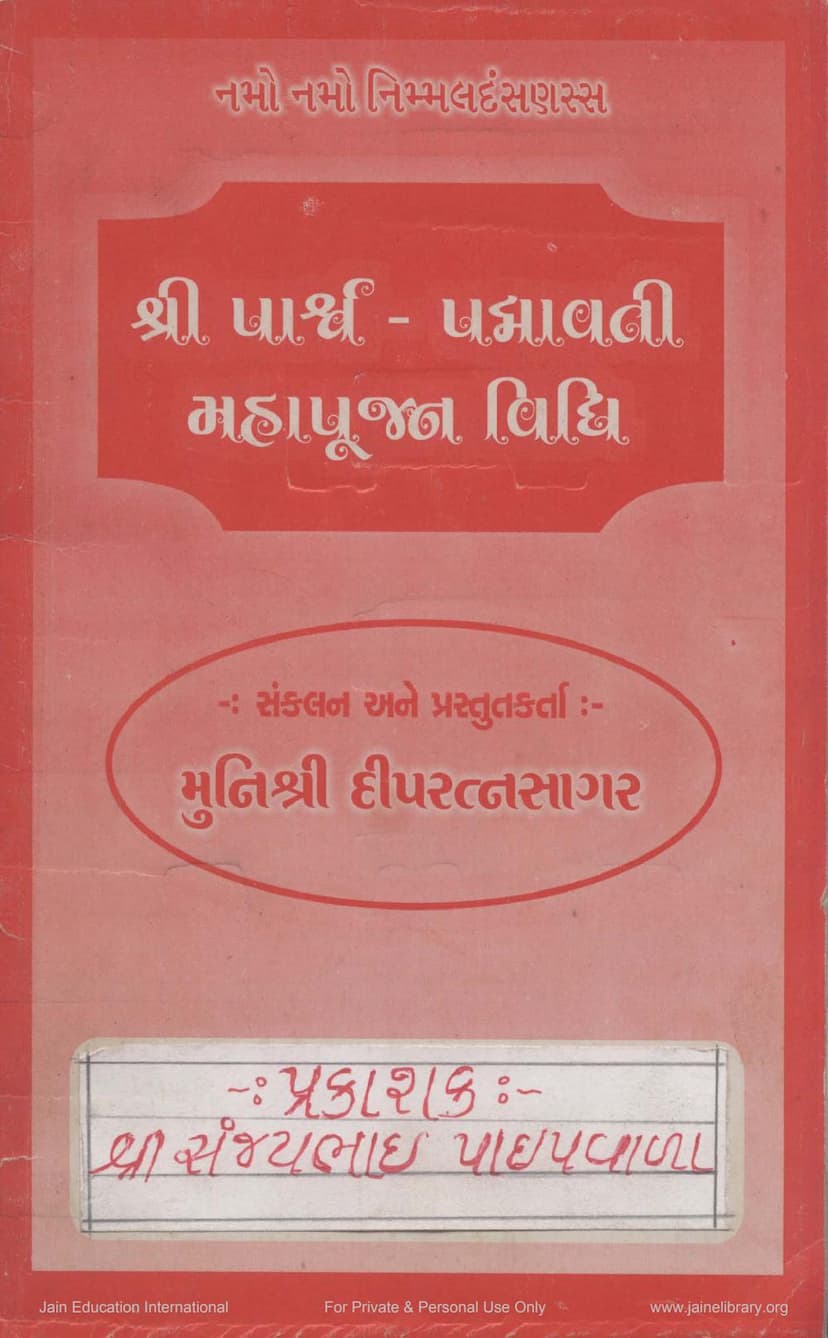Parshwa Padmavati Mahapujan Vidhi
Added to library: September 2, 2025

Summary
This document is a comprehensive guide to the Parshwa Padmavati Mahapujan Vidhi, a ritualistic worship ceremony dedicated to Lord Parshwanath and Goddess Padmavati in the Jain tradition. Compiled and presented by Muni Shri Dipratnasagar, and published by Sanjaybhai Pipewala, this text outlines the entire process, from the initial preparations to the final blessings.
Here's a breakdown of the key sections and their content:
1. Introduction and Dedication (Pages 1-5):
- The book begins with invocations and dedications to revered Gurus (Pu. Shri Anand-Kshama-Lalit-Sushil-Sudharmasagar).
- It emphasizes the importance of worshipping the supreme soul (Paramaatma) alongside the Shasan Devi (ruling deity) like Padmavati, viewing it as an integral part of devotion to the Vitrag Parmatma.
- The author, Muni Shri Dipratnasagar, shares his extensive experience in consecration ceremonies and Mahapujan rituals, and his collaboration with Muni Shri Deepratnasagarji in developing this comprehensive guide.
- The intention is to offer this guide as a devotional offering to Lord Parshwanath and Goddess Padmavati, aiming to spread their glory and guide devotees towards pure Samyak Darshan (right faith).
2. Puja Samagri (Materials Required) (Pages 3-4):
- A detailed list of all the necessary items for the Mahapujan is provided. This includes:
- Water Puja: Pure water, milk, ghee, yogurt, sugar, rosewater.
- Fragrance Puja: Vaskshep (colored rice), Ashtagandha (eight fragrances), sandalwood, perfumes.
- Rice Puja: Unbroken rice, cloves, grated coconut.
- Flower Puja: Lotuses, red flowers (Kareen) or roses, other fragrant flowers, garlands.
- Naivedya Puja (Food Offerings): Rock sugar, Ghevar, Lapsi, five types of sweets, Kheer, lentil fritters.
- Lamp Puja: Diyas or glasses, ghee, matches.
- Incense Puja: Dhupdhana, fragrant incense, agarbattis.
- Fruit Puja: Almonds, coconuts, Bilva fruit, seven types of fruits.
- Clothing Puja: Chundadi (a type of veil).
- Jewelry Puja: Sixteen types of ornaments.
- Utensils: Various vessels for offerings, water, and rituals.
- Dehrasarji Items: Items used in a temple setting like canopies, flags, lamps, etc.
- Other Materials: Kumkum, saffron, camphor, sacred thread, sacred cloth, materials for counting (mala/rosary), etc.
- Mandap (Altar) Materials: If a specific altar is to be prepared.
- Money: Small coins for offerings.
- A specific list for Shodashabharana Puja (worship with sixteen ornaments) is also provided.
3. Ritualistic Procedures (Pages 6-33):
- Mangal Prarambh (Auspicious Beginning): The recital of the Navkar Mantra (Pancha Namaskara).
- Deep Prajvalan (Lighting the Lamp): A specific mantra for lighting the lamp.
- Bhumi Shuddhi (Purification of the Ground): Mantras for purifying the space.
- Amrutabhishek (Anointing with Nectar): Mantras for symbolic purification and showering of blessings.
- Kalamsha Dahan (Burning of impurities): Mantras for removing negative influences.
- Hridaya Shuddhi (Purification of the Heart): Mantras for purifying the heart.
- Pancha Beej Dharana (Meditation on Five Seed Syllables): Specific seed syllables associated with different body parts.
- Digbandhan (Binding the Directions): Mantras and actions for securing the directions.
- Anguli Nyaas & Anga Nyaas (Placement of Fingers & Limbs): Ritualistic placement of fingers and hands on body parts with mantras for protection.
- Vajrapanjar Stotram: A powerful hymn for protection.
- Rakshabandhan (Tying of Sacred Thread): Binding sacred threads with protective mantras.
- Dikumarikao ne Tilak & Tilak Vidhi: Applying tilak to directional deities and the main deities.
- Shri Parshwanath Pujan (Worship of Lord Parshwanath):
- Recitation of Sthutis (hymns) in praise of Lord Parshwanath.
- Worship using Vaskshep (colored rice) and the mantra "Om Hreem Arham Shri Parshwanathay Namah."
- Offering of flowers and garlands.
- Agrapuja (preliminary worship) with rice, money, and offerings.
- Recitation of the Uvassaggahara Stotra (hymn for warding off calamities) three times.
- Yantra Sanskar (Consecration of the Yantra): If a Yantra is used, it is consecrated with milk, water, and cleansing.
- Padmavati Stotra (Hymn to Goddess Padmavati): A lengthy and detailed hymn in praise of Goddess Padmavati, with specific mantras for each verse.
- Shri Padmavati Pujan (Worship of Goddess Padmavati):
- Invocation (Aahvan), Installation (Sthapana), and Inviting Presence (Sannihitikaran) of the Goddess.
- Beginning the worship with the mantra.
- Ashta Prakari Puja (Eight Types of Worship): This is the core of the ritual, performed for Goddess Padmavati, with specific mantras and offerings for each type:
- Jal Puja (Water Worship): Using panchamrit (five nectars) and pure water.
- Gandha Puja (Fragrance Worship): Using Vaskshep, Ashtagandha, etc.
- Akshata Puja (Rice Worship): Using unbroken rice.
- Pushpa Puja (Flower Worship): Offering flowers.
- Naivedya Puja (Food Offering Worship): Offering sweets and food items.
- Deep Puja (Lamp Worship): Offering lamps.
- Dhupa Puja (Incense Worship): Offering incense.
- Phala Puja (Fruit Worship): Offering fruits.
- Vastra Puja (Clothing Worship): Offering clothing (Chundadi).
- Abhushana Puja (Jewelry Worship): Offering ornaments.
- Swaroop ka Dhyan (Meditation on Form): A verse to meditate on Goddess Padmavati's form.
- Manorath Sankalp (Resolution of Desire): The main devotee makes a specific resolution.
- Dakshina & Ashirvad (Offering and Blessings): Offering dakshina to the priest and receiving blessings.
- Aarti: Recitation and performance of Aarti (devotional song with lamps) for Lord Parshwanath and Goddess Padmavati.
- Shri Brihacchanti Stotram: A grand hymn for peace and well-being.
- Chaitnyavandan & Stotra Path: Reciting hymns in praise of Lord Parshwanath.
- Kshama Prarthana (Prayer for Forgiveness): Seeking forgiveness for any errors during the ritual.
- Visarjan (Farewell): A mantra for respectfully bidding farewell to the deities.
- Antya Mangal (Final Auspiciousness): A concluding verse.
In essence, the Parshwa Padmavati Mahapujan Vidhi is a detailed, step-by-step manual for performing a significant Jain ritual. It emphasizes devotion, purification, and the invocation of blessings from Lord Parshwanath and Goddess Padmavati for the well-being and spiritual progress of the devotees. The text is rich with Sanskrit and Gujarati mantras and hymns, reflecting the devotional and ritualistic depth of Jainism.